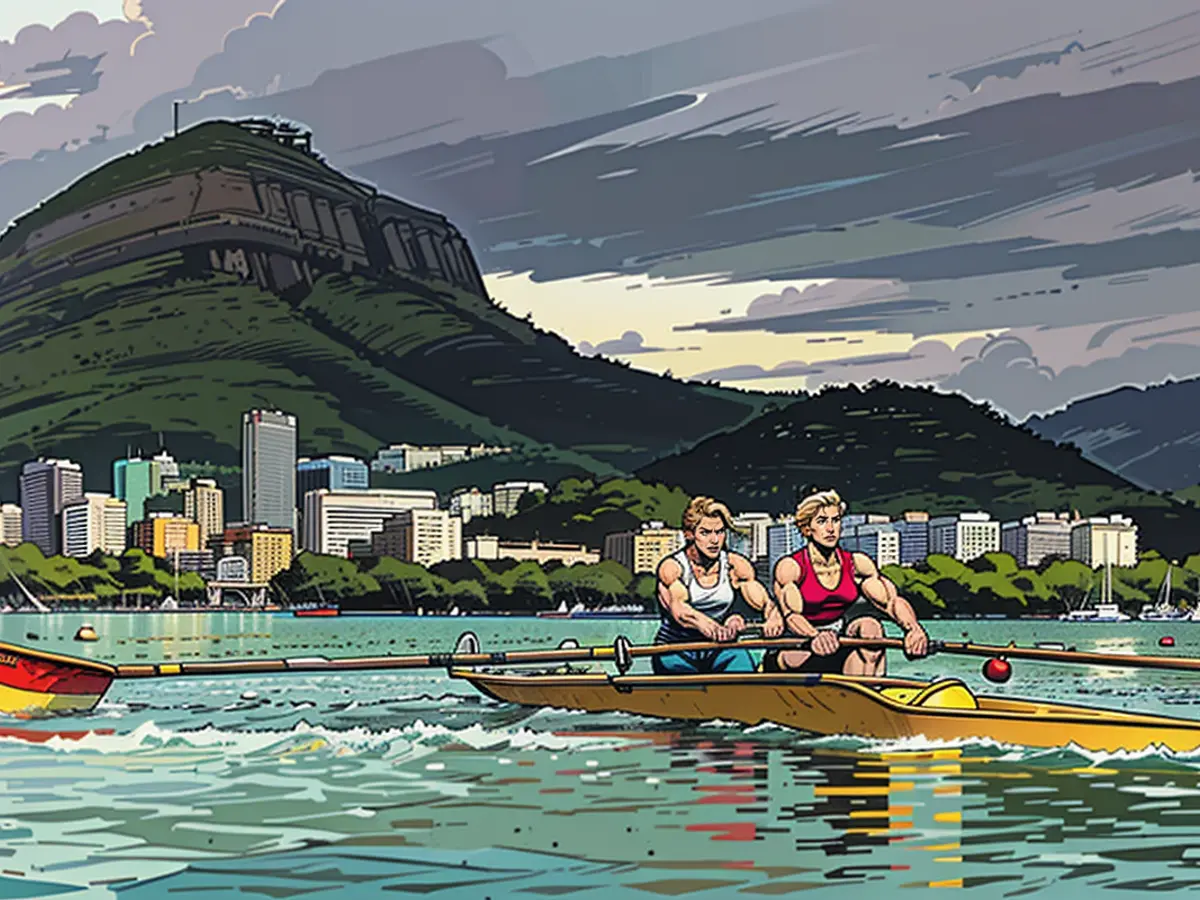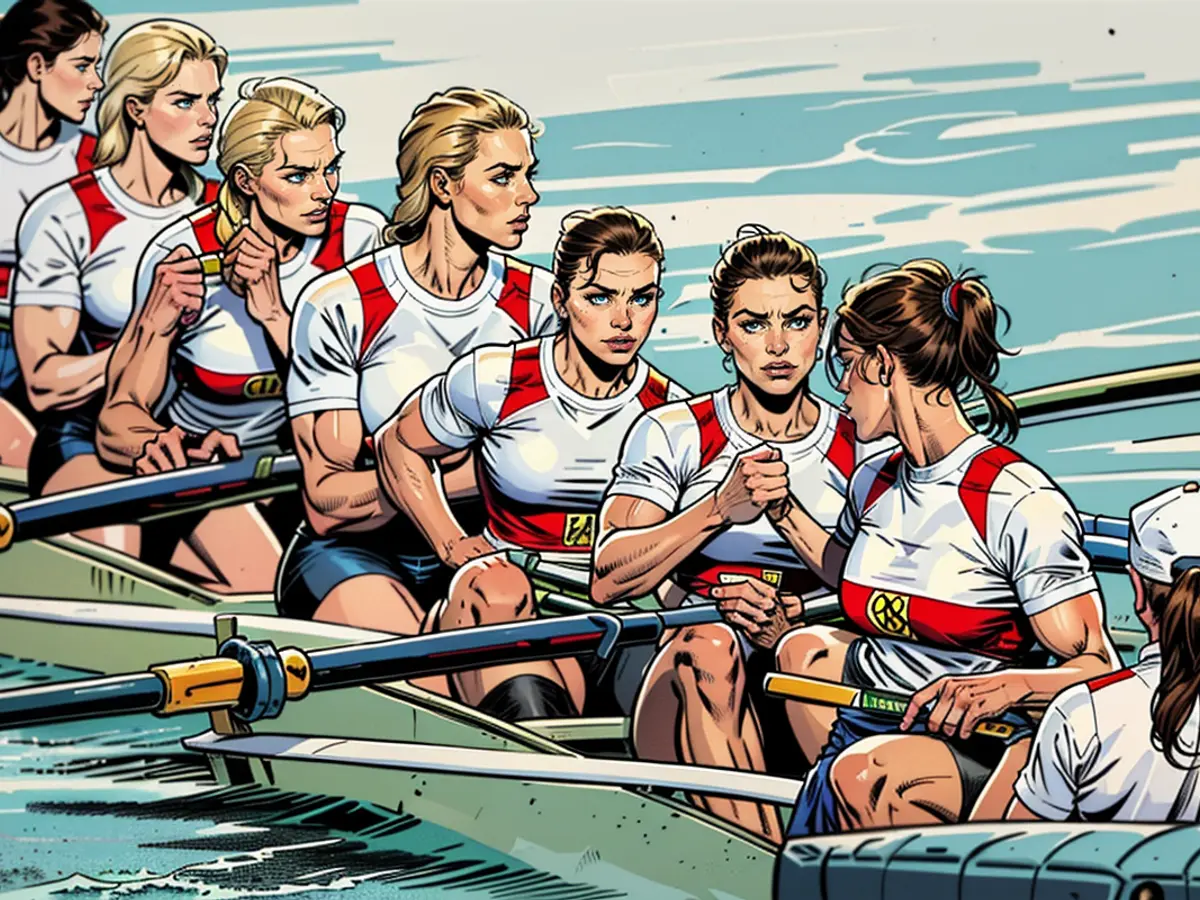Transforming into a para-rower due to a stroke in an Olympic athlete's career
Kathrin Marchand started rowing at 14. Post participating in two Olympics in London 2012 and Rio 2016, she decided to hang up her competitive rowing gear. Sadly, a stroke struck while she was just starting her medical career. After rehab, she aspired to return to both her doctor job and rowing. In Paris, the 33-year-old will compete in the quadruple sculls at the Paralympics, aiming for a medal. In an interview with ntv.de, she discusses her aspirations and journey back to rowing.
ntv.de: You'll compete in the quadruple sculls at the Paralympics on September 1st. It's the same day you had your stroke three years ago. How does that feel?
Kathrin Marchand: Initially, I found it quite coincidental. I mean, one out of 365 days, right? But I don't see it as a bad omen. Maybe it's fate. I'm gonna make it count. It motivates me.
How has life altered for you post-stroke?
I'd always thought I was in tip-top shape. Then, out of the blue, I was struck down. I can't do as many things now. Plus, I've got an 'unusual' disease for someone my age. The rehab period was tough. I was surrounded by seniors mostly. At my age, it was hard to accept I was no different. Many were battling more than just one illness. Rehab wasn't exactly my idea of a good time.**
Why not?
It was like a reminder that I was really ill. Something I'd never had to deal with before. It was like looking into a mirror, and not liking what I saw. I had a tough time accepting it.**
How did you turn things around?
I wanted to turn this situation around. I didn't want to pull up the blankets and wait for retirement. I wouldn't last a week. I knew I didn't want to spend my days on a pension yet.**
And how's it going now?
I've found my groove again. I work mornings, four days a week. Then I come home, rest, and get some Zs. After lunch, I hit the gym for a bit. Rowing's back in my life now. It's a beautiful sport. The rhythm of it, the bond with nature...it's almost meditative. When I'm out there, I forget about everything else.**
Why did you stop rowing in 2016?
After the Rio Olympics, I felt like I'd reached a crossroads. I felt that maybe I wouldn't recover much further. I might have qualified for Tokyo, but then I'd probably have ended up in the B-final. I didn't want to invest that much energy anymore.**
Why not?
I wanted to focus on my studies. A career in sports doesn't pay too well. Plus, I had to take two months off unpaid to participate in the Paralympics. And just as I started working as a doctor, I had the stroke.**
Did that mean you couldn't work anymore?
Yes. For nine months, I couldn't work.
And then, what happened?
Remembering the joy of rowing, during my downtime, I decided to give it another go.**
How did you get back into it?
My neighbor, who also rows, used to take me along when she went rowing. While she was in the boat, I'd do laps on the side. She encouraged me and suggested I get back into the boat again. Eventually, I did and enjoyed it.**
You have visual impairment. How much can you see while rowing?
My visual impairment poses the biggest challenge in my daily life. I can't see a whole third of my visual field in both eyes. Learning visually isn't an option anymore, and I find it hard to learn new movement patterns. But I can still row. I just had to remember the ones I had before. It felt weird at first.
What was different exactly?
I felt a wall to my left. Everything seemed dark on that side. I couldn't see what was happening in the boat, or the opponents on that side. I had to adjust to it.
How did you ultimately join para-sports?
When I heard about the Paralympic Winter Games on the radio, I thought why not give it a shot. I applied for classification.
How does that work exactly?
I thought I'd be classified based on my visual impairment, but that didn't work out. I can see too much. People need to have at least half of their visual field missing. I thought that was it for me.
But?
Since I'm accountable for nationwide rowing classifications, including at our club, Anna Rohde suggested I apply for classification due to my coordination shortcomings, specifically with my right-left rowing alignment. I mentioned my struggles with this to her, and despite thinking the subject was closed, I agreed to her prompting. Consequently, I submitted an application focusing on my left-sided coordination and strength challenges.
And then?
Following that, a neurologist assessment was required, which confirmed my medical diagnosis. I then proceeded with my application, which was subsequently accepted, and I was invited for an appointment. During my classification meeting, a doctor and a rowing-focused specialist evaluated me. They analyzed my strength levels, arm flexibility, and coordination skills through exercises. My performance in various movement patterns was noted, with points assigned based on my weaknesses. Ultimately, I fell short of the required points for classification.
What are you most looking forward to as you prepare for your third Games, but this time at the Paralympics?
I'm excited about the competitions. These events are unique, happening every four years, making them something special. Additionally, I'm eager to experience the communal life in the Paralympic Village and explore the city of Paris. France, particularly Paris, warmly welcomes us.
However, the rowing competitions aren't happening in Paris, but in Vaires-sur-Marne.
Although we stay at the Paralympic Village, we commute by bus to Vaires-sur-Marne for both training and competitions. It's a bit inconvenient due to the one-hour journey each way. Nonetheless, it's motivating to be in the village to soak in the overall atmosphere.
What are your goals?
Our team aim is to secure a spot on the podium in the quadruple sculls. Although it will be challenging, it would be an accomplishment.
Why might it be challenging?
The Paralympics are not an easy feat. This year, we've faced numerous injuries, illnesses, and withdrawals from competitors. However, our objective remains to win a medal and continue our successes from past years.
Are you also anxious?
The distinctiveness of the Olympic and Paralympic Games, held every four years, contributes to the special aura these competitions carry. When I started rowing, I perceived participating in such an event as a significant achievement. However, I've come to realize that I need only deliver my best performance during training. Nevertheless, I still get nervous before the race, as I strive to put forth my best effort and sometimes succumb to pressure.
How do you cope with the pressure individually?
On occasion, I utilize the services of a sports psychologist to mentally prepare for the competition. They provide me with valuable tips that I can implement in Paris.
What kind of tips?
I visualize the race in my mind and familiarize myself with the situation, which includes better understanding the environment and becoming proficient in maintaining concentration and blocking out distractions.
How does your team navigate the pressure?
As a team, we share the same anxiety before the race. I, too, feel the anticipation and excitement. However, as someone with the most rowing experience within our team, I endeavor to exude confidence and assure my teammates that we're on the right track. Our training sessions have prepared us well, and we can translate those successes to the competition.
Collaboration is crucial for your team and relying on each other is key. What is it like rowing in a quadruple sculls team?
Rowing in a team is enjoyable. We inspire and motivate each other, which serves as an excellent reason to train hard. We've known each other for three years, and we're patently aware of each other's strengths and weaknesses. Camaraderie ensures no one is left alone.
What will you do after the competition?
After the competition, I'll continue to support the team until the end of the Paralympics. I plan to watch other sports and relish the overall Games atmosphere. The closing ceremony is an event I anxiously anticipate. I'll take time to unwind and appreciate the journey, which included several challenges. On September 23rd, I must return to work.
Rebecca Wegmann held a conversation with Kathrin Marchand
Kathrin Marchand will compete in the quadruple sculls at the Paralympics in Paris, aiming for a medal. Despite having her stroke on the same day three years ago, she sees it as a motivation rather than a bad omen.
After rehabilitation and returning to her doctor job, Marchand's love for rowing brought her back to the sport. She will be participating in the Paralympics, showcasing her resilience and determination.










